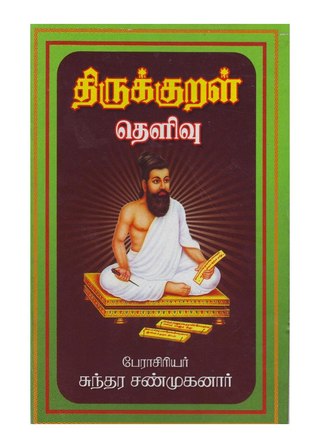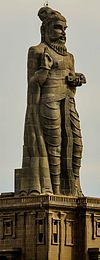Related Research Articles

Thiruvalluvar, commonly known as Valluvar, was an Indian poet and philosopher. He is best known as the author of the Tirukkuṟaḷ, a collection of couplets on ethics, political and economic matters, and love. The text is considered an exceptional and widely cherished work of Tamil literature.
Parimelalhagar, sometimes spelled Parimelazhagar, born Vanduvarai Perumal, was a Tamil poet and scholar known for his commentary on the Thirukkural. He was the last among the canon of ten medieval commentators of the Kural text most highly esteemed by scholars. He was also among the five oldest commentators whose commentaries had been preserved and made available to the Modern era, the others being Manakkudavar, Pari Perumal, Kaalingar, and Paridhi. Of all the ancient commentaries available of the Kural literature, Parimelalhagar's commentary is considered by scholars as the best both in textual and literary aspects. The codification of the writings of Valluvar is attributed to Parimelalhagar. Parimelalhagar also remains the most reviewed, in terms of both praise and criticism, of all the medieval Kural commentators. Praised for its literary richness and clarity, Parimelalhagar's commentary is considered highly complex and exquisite in its own right that it has several scholarly commentaries appearing over the centuries to elucidate it. Along with the Kural text, Parimelalhagar's commentary has been widely published that it is in itself regarded a Tamil classic.

The Tirukkuṟaḷ, or shortly theKural, is a classic Tamil language text consisting of 1,330 short couplets, or kurals, of seven words each. The text is divided into three books with aphoristic teachings on virtue (aram), wealth (porul) and love (inbam), respectively. It is widely acknowledged for its universality and secular nature. Its authorship is traditionally attributed to Valluvar, also known in full as Thiruvalluvar. The text has been dated variously from 300 BCE to 5th century CE. The traditional accounts describe it as the last work of the third Sangam, but linguistic analysis suggests a later date of 450 to 500 CE and that it was composed after the Sangam period.

Sarvajna and Tiruvalluvar are popular Kannada and Tamil poets, respectively. Statues of Sarvajna in Tamil Nadu and Tiruvalluvar in Karnataka has been unveiled in August 2009 as a symbolic effort to bolster ties between the two Indian states, whose relationship has been strained by issues related to sharing of Kaveri water and Hogenakkal water supply power project.
The Tirukkural, shortly known as the Kural, is a classic Tamil sangam treatise on the art of living. Consisting of 133 chapters with 1330 couplets or kurals, it deals with the everyday virtues of an individual. Authored by Valluvar between the first century BCE and 5th century CE, it is considered one of the greatest works ever written on ethics and morality and is praised for its universality and non-denominational nature.
Tirukkural, also known as the Kural, an ancient Indian treatise on the ethics and morality of the commoner, is one of the most widely translated non-religious works in the world. Authored by the ancient Tamil poet-philosopher Thiruvalluvar, it has been translated into at least 42 world languages, with about 57 different renderings in the English language alone.

Tirukkural remains one of the most widely translated non-religious works in the world. As of 2014, there were at least 57 versions available in the English language alone. English, thus, continues to remain the language with most number of translations available of the Kural text.
As of 2020, there were at least four translations of the Tirukkural available in Arabic. The Kural text is the first, and so far the only, Tamil work to be translated directly into Arabic. It is also the first Tamil work to be released in the Arabian soil.

Among the European languages, German has the third highest number of translations of the Tirukkural, after English and French. As of 2015, there were at least eight translations of the Kural text available in German.
As of 2015, the Chinese language had two translations available of the Tirukkural.
As of 2015, the Japanese language has two translations available of the Tirukkural.
Malayalam has seen the most number of Tirukkural translations than that of any other language in India. As of 2007, there are at least 21 translations of the Kural text available in Malayalam. Malayalam also has the distinction of producing the first ever translation of the Kural text among the languages in India and the world at large. The Annual Report of the Cochin Archeological Department for the year 1933–34 reported an unpublished manuscript of a Malayalam translation of the Tirukkural made in 1595.
Telugu is one of the Indian languages that has had the earliest Tirukkural translations in modern times. As of 2000, there were at least 14 translations of the Kural text available in Telugu.
As of 2015, there were at least three Gujarati translations available of the Tirukkural.
As of 2015, Tirukkural has been translated into Sinhalese at least twice.
Korean has at least two translations of the Tirukkural available as of 2017.
E. S. Ariel, also referred to as Monsieur Ariel by his contemporaries, was a 19th-century French translator known for his French translation of the ancient Indian philosophical text of the Tirukkural. He translated select couplets of the Tirukkural into French in 1848 and published it in Paris under the title Kural de Thiruvalluvar . Although the first French translation of the Kural text was made by an unknown author in 1767, which Ariel had mentioned in his work, it was Ariel's translation that brought the ancient work to the French world.

P. C. Kokila is an Indian professor of Hindi, who is best known for translating the Tirukkural into Gujarati.
Soibam Rebika Devi is an Indian translator who is best known for translating the Tirukkural into Meitei.
Thiruvalluvar Award is an annual award given by the State Government of Tamil Nadu, India, in memory of the ancient poet-philosopher Valluvar. It is given to those who have made an outstanding contribution towards the Kural literature and its philosophy. It is given in January of every year since 1986, on the 2nd day of the Tamil month of Thai observed by the Tamil Nadu government as the Thiruvalluvar Day, and is given on behalf of Tamil Development Authority.
References
- 1 2 Rajaram, R. (19 June 2014). "Chinese translation of Tirukkural, Bharathi's poems ready". The Hindu. Chennai. Retrieved 19 August 2016.
- 1 2 3 4 Express News Service (16 January 2014). "Taiwan-origin Tamil Scholar Gets Thiruvalluvar Award". The New Indian Express. Express Publications. Archived from the original on 20 October 2014. Retrieved 19 August 2016.
- ↑ PTI (7 November 2015). "Taiwanese poet Yu Hsi lauds TN CM Jayalalithaa". Business Standard. Retrieved 19 August 2016.
- 1 2 3 4 5 6 Renganathan, L. (29 July 2017). "A monk's love for Thirukkural". The Hindu. Thanjavur: Kasthuri & Sons. Retrieved 6 August 2017.
- 1 2 Express News Service (20 May 2010). "Kalam felicitates Taiwanese poet Yu Hsi". The New Indian Express. Chennai: Express Publication. Retrieved 19 August 2016.[ dead link ]
- ↑ Sadique, Shahnawaz (17 January 2014). "Taiwanese Poet Dr Yu Hsi Was Awarded The Thiruvalluvar Award on 15 January 2014". Commonstupidman.com. Retrieved 19 August 2016.
- ↑ "திருக்குறளில் இல்லாதது எதுவும் இல்லை: திருவள்ளுவர் விருது பெற்ற தைவான் கவிஞர் யூசி பேச்சு". The Hindu (Tamil) (in Tamil). Chennai: Kasturi & Sons. 16 January 2014. Retrieved 6 August 2021.
